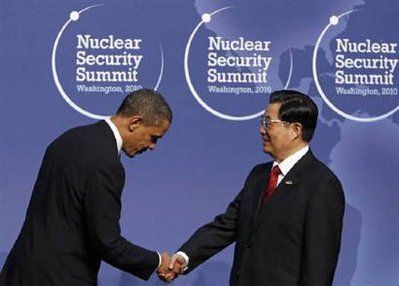Speak loudly and carry a big stick.
WASHINGTON: "Speak softly; carry a big stick," was turn-of-last century American President Teddy Roosevelt's geo-political prescription for a fledgling world power. "Lie low for another 50 years before challenging America," Chinese statesman Deng Xiaoping counselled his developing country some 20 years ago.
Leading a country that is perceived to be weakening economically, President Obama abandoned the speak softly advise to publicly hector his Chinese counterpart Hu Jintao on issues ranging from human rights to currency manipulation to intellectual theft.
No topic was off limit as Obama touched on Taiwan, Tibet, Iran, Sudan, the Korean peninsula to mark out US interests across the globe before letting it be known that Washington was not about to cede its role as a Pacific power, much less a world force.
It was a compelling performance that impressed US pundits, one of whom was relieved that he had demonstrated that "America is not quite so weak and disoriented as the Chinese might have imagined after the financial crisis and the soggy Iraq-Afghanistan wars."
As if to rub in the fact that the US is not overawed by China's rise, and has other Asian options, a top Coca-Cola honcho startled everyone at a reception with a gaffe involving raising a toast for President Hu in Japanese – saying "kanpai" (cheers) instead of the similar sounding "ganbei" in Mandarin.
.
WASHINGTON: "Speak softly; carry a big stick," was turn-of-last century American President Teddy Roosevelt's geo-political prescription for a fledgling world power. "Lie low for another 50 years before challenging America," Chinese statesman Deng Xiaoping counselled his developing country some 20 years ago.
Leading a country that is perceived to be weakening economically, President Obama abandoned the speak softly advise to publicly hector his Chinese counterpart Hu Jintao on issues ranging from human rights to currency manipulation to intellectual theft.
No topic was off limit as Obama touched on Taiwan, Tibet, Iran, Sudan, the Korean peninsula to mark out US interests across the globe before letting it be known that Washington was not about to cede its role as a Pacific power, much less a world force.
It was a compelling performance that impressed US pundits, one of whom was relieved that he had demonstrated that "America is not quite so weak and disoriented as the Chinese might have imagined after the financial crisis and the soggy Iraq-Afghanistan wars."
As if to rub in the fact that the US is not overawed by China's rise, and has other Asian options, a top Coca-Cola honcho startled everyone at a reception with a gaffe involving raising a toast for President Hu in Japanese – saying "kanpai" (cheers) instead of the similar sounding "ganbei" in Mandarin.
.



